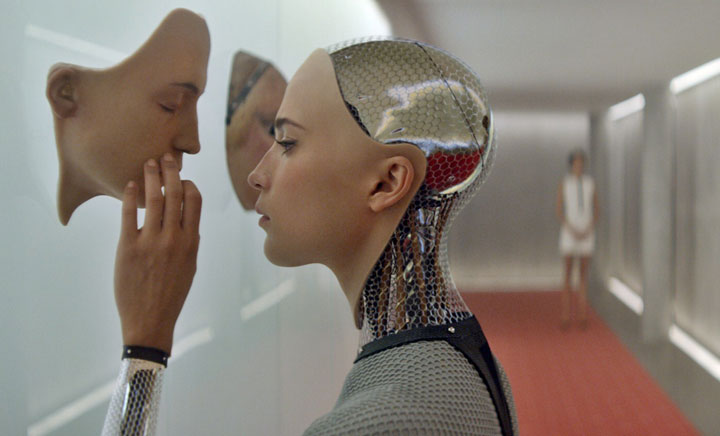TORONTO – Alex Garland makes his directorial debut with the sci-fi thriller Ex Machina, but don’t call him a director.

A misdirector, maybe.
The novelist-turned-filmmaker downplays his role in shaping the movie, a nuanced tale of a computer programmer tasked with assessing a robot’s very convincing artificial intelligence and human qualities.
The very idea of the director-as-auteur sends Garland on a spontaneous rant.
“When we make a big deal about directors we disguise something true about film which is that it’s a team — it’s a group of people working together,” Garland insists in a recent visit to Toronto to promote the film.
“The director obsession sort of obfuscates that.”
A lot of what viewers will respond to in Ex Machina — already a critical smash on the festival circuit — is the work of the director of photography, the production designer and the sound designer, he predicts.
“I don’t like taking attention away from a team of people,” he adds.
Still, the story began with Garland, an accomplished scribe who also penned the zombie film 28 Days Later, the pensive cloning saga Never Let Me Go, and the futuristic Dredd.

Get breaking National news
Domhnall Gleeson stars as Caleb, a brilliant but sensitive young man who wins a competition to spend a week with his intimidating boss Nathan (played by bulked-up Oscar Isaac) who runs a Google-like tech company.
When Caleb arrives at Nathan’s secluded mountain retreat, he learns he’s there to take part in an experiment to assess the artificial intelligence of Nathan’s latest creation, dubbed Ava, played by Alicia Vikander.
- ‘Home Improvement’ star Zachery Ty Bryan jailed after 6th arrest in 5 years
- Robert Carradine, ‘Lizzie McGuire’ and ‘Revenge of the Nerds’ actor, dead at 71
- Eric Dane GoFundMe for daughters, health-care costs tops $300,000
- What happened at the BAFTAs? BBC apologizes after racial slur shouted at actors
Despite the fact Ava is obviously a machine, it doesn’t take long for Caleb to conclude she is a conscious being.
Garland says he knew audiences who’d also seen Ridley Scott’s noir masterpiece Blade Runner would be tempted to compare the characters and start making assumptions about where things are headed.
And to him, that was useful.
“Because I can exploit it,” he says.
“There’s two kinds of audience members: There’s one which don’t really ask any questions. They relax and just let the story happen and I think that’s probably the most enjoyable way to watch a film…. But there is another kind of audience whose antennae are up and they’re sort of twitching and they’re hunting to sort of second-guess to see where it’s going.”
The trick is to make that audience feel like they know how things turn out. Without giving things away, that means planting certain seeds along the way.
“At that point they then relax and can then sort of enjoy the story. Or at least that’s my theory,” says Garland, author of the 1996 backpacking novel The Beach.
There’s no shortage of big ideas in Ex Machina.
In tackling the screenplay, Garland started with “a bunch of questions.”
“Some of them were things to do with sentience and consciousness. Some of them were to do with artificial intelligence and I was interested in why people feel afraid of AI, because I don’t feel afraid of AI…. And some of them are quite general and abstract, they’re things like: Where does gender reside? Is gender something that’s in consciousness or is it a physical thing? Or is it something that’s conferred on you by other people?”
For his part, the London-based Garland doesn’t necessarily take a stand on whether we should pursue artificial intelligence. Like nuclear power, persuasive arguments can be made for either side, he says.
“It’s not good or bad but what (this film) is saying is it’s very powerful and it has complicated issues around it and so the right way to approach it is to think about it,” he says.
“If it’s possible, it’s going to happen. And in those terms, the right conversation is not ‘Should you?/Shouldn’t you?’ but more, how do you deal with it when it does?”
Ex Machina opens Friday in Toronto and Vancouver.
It heads to Halifax, Ottawa, Winnipeg, Calgary, Edmonton and Victoria on May 1, and to Montreal on May 8, before continuing to other cities.









Comments
Want to discuss? Please read our Commenting Policy first.